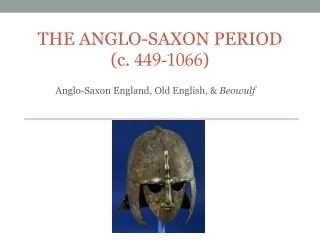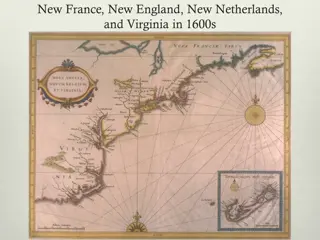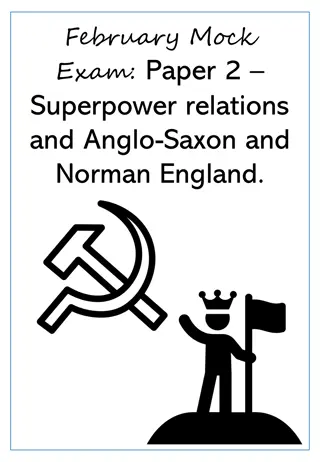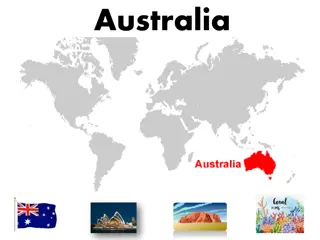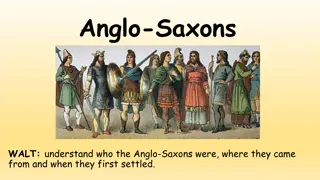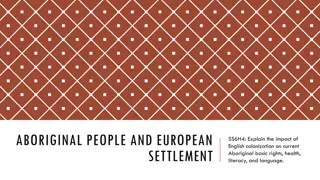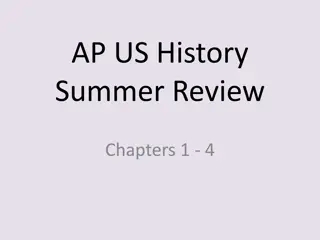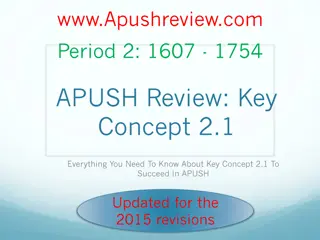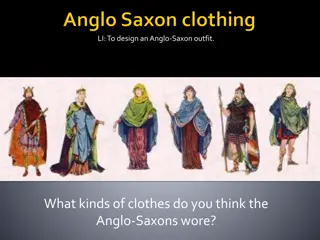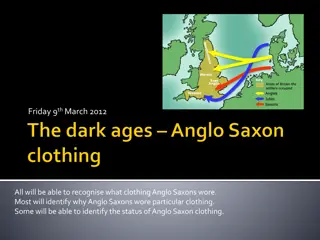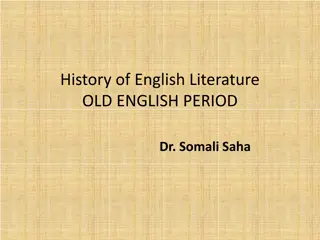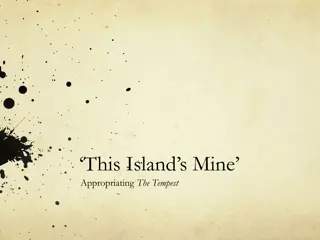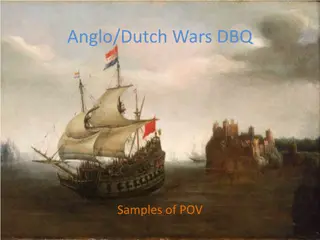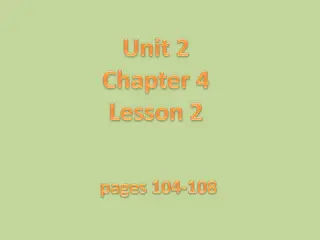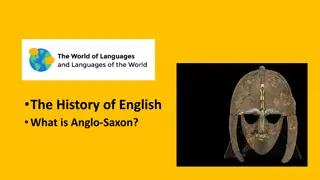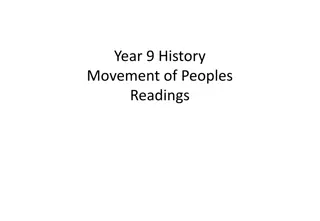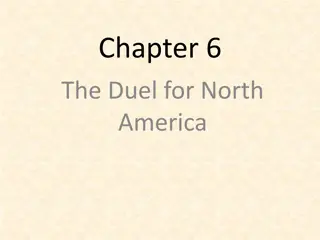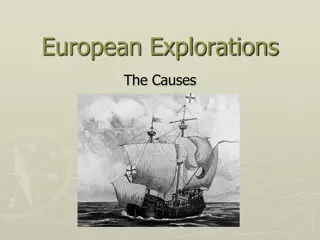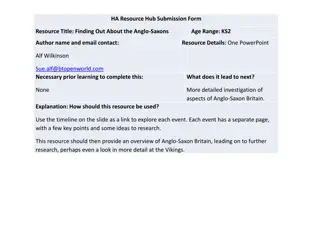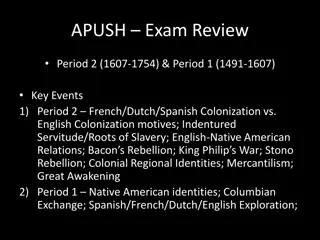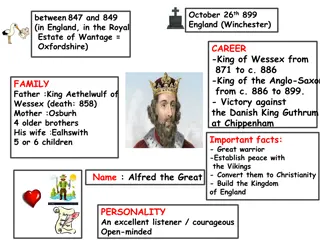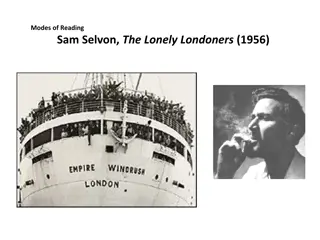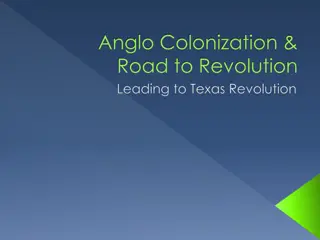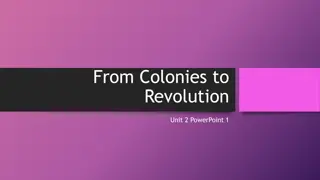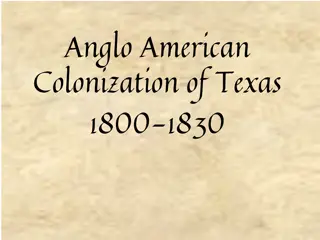The Anglo-Saxon Period: Migration and Integration in Angleland
The Anglo-Saxon period (c. 449-1066) in England saw a dynamic interplay of various cultures, including the Celts, Romans, and Germanic tribes. The arrival of Angles, Saxons, Jutes, and others led to the formation of Angleland (England), with societal structures based on heroic ideals like courage an
2 views • 20 slides
Anglo-Maratha Wars: A Historical Overview
The Anglo-Maratha Wars were a series of conflicts between the British East India Company and the Maratha Empire in India, spanning three wars from 1775 to 1818. The wars resulted in significant territorial changes and power shifts in the region, shaping the history of India during that period.
0 views • 10 slides
Colonization and Indigenous Perspectives in 1600s North America
Explore the colonization efforts in 1600s North America by New France, New England, New Netherlands, and Virginia, along with English settlers' perspectives on Native Americans. Discover the contrasting views on land use, settlement practices, and interactions with indigenous populations through his
6 views • 6 slides
Analyzing Historical Sources on Suffragettes, Colonization, and Church Reform
This content focuses on different types of historical sources related to the Suffragette movement, colonization, and Church reform during the medieval period. The primary and secondary sources mentioned include the Tower of London, a letter by William of Normandy, a replica Suffragette sash, Dover C
2 views • 8 slides
Anglo-Saxon, Norman England, and Superpower Relations Study Plan
Year 11 homework schedule and revision plan covering topics such as Anglo-Saxon and Norman England, Superpower Relations, Cold War events, and key historical figures. Resources include BBC Bitesize, Seneca, and GCSEPod for comprehensive study material and quizzes.
0 views • 12 slides
Life as an Anglo-Saxon Child - Insights and Imaginations
Delve into the world of Anglo-Saxon children through reflections, images, and challenges. Explore the daily life, chores, education, and pastimes through a creative diary entry challenge. Unveil the intricacies of their upbringing in an engaging and informative journey into the past.
5 views • 13 slides
Discovering Australia: Geography, History, and Impact of Colonization
Australia, with its unique features like the Great Barrier Reef, Uluru/Ayers Rock, and diverse ecosystems, has a rich history shaped by colonization and the impact on Aboriginal communities. This article explores Australia's geography, natural resources, population distribution, and the effects of E
0 views • 15 slides
Creating an Anglo-Saxon House Drawing: A Step-by-Step Guide
Explore the world of Anglo-Saxon houses through a series of activities designed to help you draw your own representation. Follow instructional videos and resources to learn various techniques like drawing 3D shapes, using vanishing points for perspective, and shading to depict different building mat
0 views • 7 slides
Understanding Normal Human Microbiota and Its Role in Health
Normal Human Microbiota, consisting of microbes on the skin and mucous membranes, play a crucial role in human health by providing defense against pathogens, aiding in digestion, and contributing to immune system maturation. The microbiota can be resident or transient, with colonization starting at
0 views • 27 slides
Kennings for Granddad - A Poetic Tribute in Anglo-Saxon Style
Dive into the ancient art of kennings with a playful tribute to Granddad, creatively capturing his everyday actions with descriptive phrases like "armchair hogger" and "history homework helper." Explore the imaginative world of figurative language reminiscent of the Anglo-Saxon era in this unique po
0 views • 4 slides
Origins and Migration of the Anglo-Saxons
The Anglo-Saxons originated from Denmark, Germany, and the Netherlands, arriving in England via wooden boats to establish themselves as warrior-farmers. This invasion led to the Angles and Saxons dominating and merging into the Anglo-Saxons, who settled in Britain for reasons such as conquest, farmi
0 views • 8 slides
Crime and Punishment in Anglo-Saxon Times
Life in Anglo-Saxon Britain (410-1066CE) involved small village living, limited urbanization, community policing, and unique forms of justice like trials by ordeal and weregild fines for crimes. The system was decentralized, with neighbors and tithings responsible for law enforcement and punishment
0 views • 8 slides
Impact of English Colonization on Aboriginal Rights and Health in Australia
English colonization in Australia had a profound impact on current Aboriginal basic rights, health, literacy, and language. The arrival of Europeans led to the decimation of the Aboriginal population through diseases like smallpox, displacement from their lands, loss of cultural practices, and suppr
2 views • 9 slides
Exploration and Colonization of the Americas
Before Columbus, Native American groups thrived across the Americas, ushering in the Agricultural Revolution. European explorers like Columbus, Portuguese, and Spanish ventured west in search of Eastern goods and new lands, leading to colonization, conflicts, and the Columbian Exchange. Motivated by
2 views • 56 slides
Key Concepts of Colonization in North America: 1607-1754
Europeans from Spain, France, the Dutch, and England established colonies in North America with differing economic and imperial goals. Spain aimed for strict control and exploitation, while the French and Dutch focused on trade partnerships with Native Americans. English colonization attracted a lar
0 views • 11 slides
Anglo-Saxon Clothing: Design and Comparison with Modern Attire
Explore the clothing worn by Anglo-Saxons, including details on men's and women's outfits, accessories, and footwear. Learn about the similarities and differences between Anglo-Saxon attire and modern clothing styles. Get inspired to design an everyday outfit following Anglo-Saxon fashion, with a fu
0 views • 6 slides
Discovering Anglo-Saxon Clothing: Materials and Styles
Explore the clothing worn by Anglo-Saxons, including materials like wool and natural fibers, and different styles for men and women. Learn about tunics, dresses, leggings, brooches, and more. Get creative by designing your own Anglo-Saxon outfit for a party using the inspiration from historical imag
0 views • 9 slides
Overview of Anglo-Saxon Literature in Old English Period
The Old English period in English literature, dominated by the Anglo-Saxons, showcased a rich tapestry of poetic works, notable authors, and distinct dialects. Key literary features include pagan and Christian elements, as seen in epic poems like Beowulf and Caedmonian Poems. Additionally, the perio
0 views • 11 slides
Exploring Shakespeare's "The Tempest" Through Historical Contexts and Performance Adaptations
Delve into the world of Shakespeare's "The Tempest" by unraveling its historical inspirations from the shipwreck of the Sea Venture to the colonial backdrop of the Americas. Discover how this classic play reflects the early stages of European colonization and exploitation while examining notable per
0 views • 39 slides
Perspectives on Anglo-Dutch Wars: Documents and Views
Documents from English ambassador Sir George Downing and an anonymous pamphlet published in the Dutch Republic offer contrasting perspectives on the financial burdens and priorities during the Anglo-Dutch Wars. Sir Downing highlights the financial strain on the Dutch provinces, specifically Holland,
0 views • 26 slides
Colonization Test Review - Mr. Shaffer 2015
Explore key terms related to colonization including joint-stock companies, plantations, indentured servants, indigo, mercantilism, Middle Passage, toleration, charter, apprentice, and more. Enhance your understanding of the colonial era with this comprehensive review.
0 views • 51 slides
History of European Colonization in America
The visual content and text describe the early colonization of America by Europeans, focusing on the establishment of colonies like New Sweden and New Netherland. It illustrates the interactions between European settlers and Native Americans, the competition for land, and the growth of colonies at t
0 views • 14 slides
The Impact of Christianity and Literacy on Anglo-Saxon England
The arrival of Christianity in Anglo-Saxon England by missionaries led by St. Augustine brought about significant cultural and linguistic changes, including the introduction of literacy and the Roman alphabet. This transformation facilitated the spread of European culture, influencing the adoption o
0 views • 14 slides
Anglo-Nepal Relations: A Historical Perspective
Explore the historical events in the relationship between Britain and Nepal through the lens of Prof. Prem Singh Basnyat, tracing back to the beginnings of Anglo-Nepal physical relations and the Anglo-Nepal War. Discover the dynamics of power, conquest, and diplomacy that shaped the interactions bet
0 views • 33 slides
The Influence of Anglo-Saxon Language on Modern English
Explore the roots of Modern English in the Anglo-Saxon period, where Germanic tribes like the Angles, Saxons, and Jutes shaped the language, culture, and politics of the British Isles over 600 years. Discover how Old English, though different from present-day English, still influences a significant
1 views • 12 slides
Historical Movements: Gold Rushes and Colonization in North America and Australia
The reading explores the impact of the Gold Rush in California and Australia, leading to mass migrations in search of wealth and opportunities. It delves into the colonization efforts and expansionist pursuits of British control, discussing push and pull factors that influenced emigration to North A
0 views • 13 slides
The Duel for North America: France's Colonization Efforts
France, like England and Holland, was a latecomer in the race for North American colonies. King Louis XIV took an interest in overseas territories, leading to the establishment of Quebec in 1608. Samuel de Champlain played a key role in French colonization efforts, forging alliances with Native Amer
0 views • 20 slides
The British Exploration and Colonization Journey
British exploration and colonization efforts were motivated by various factors such as internal problems in England, surplus population, and the quest for new opportunities. Despite initial challenges and failed attempts, the British eventually began to spread their influence in the New World throug
0 views • 45 slides
Causes and Motivations Behind European Exploration and Colonization
European exploration and colonization in the 15th century were primarily driven by a quest for natural resources, the search for new trade routes to Asia, religious motivations to spread Christianity, and the desire for glory and expansion of territories. Competitions among European countries, such
0 views • 14 slides
Connections, Succession, and Trade: Insights into Anglo-Saxon England
Anglo-Saxon England in 1066 was a centralized, efficient kingdom vulnerable to invasion. Professor Stephen Baxter discusses the attractive nature of the society to invaders due to its centralization and wealth. The family tree of the Kings of England reveals intricate connections, successions, and a
0 views • 9 slides
Unlocking the World of Anglo-Saxons through Interactive Exploration
Delve into the fascinating realm of Anglo-Saxon England using this interactive PowerPoint resource. Explore key events, ask thought-provoking questions, and access valuable online resources to deepen your understanding. Ideal for KS2 students seeking to uncover the mysteries of this historical perio
0 views • 25 slides
Key Events in Early American Colonization: Motives, Interactions, and Consequences
Early American colonization during Periods 1 and 2 (1491-1754) involved various European powers establishing settlements in the New World. Driving factors included economic interests, the use of indentured servitude and the roots of slavery, complex relations with Native Americans, and significant e
0 views • 40 slides
Biography of Alfred the Great: King of Wessex and Anglo-Saxon
Alfred the Great, born in England in 847, was a renowned warrior and peacemaker who ruled both Wessex and Anglo-Saxon territories. He achieved a significant victory against the Danish King Guthrum and was known for establishing peace with the Vikings, converting them to Christianity, and strengtheni
0 views • 4 slides
Evolution of the English Language: From Celts to Anglo-Saxons
The English language has evolved from the ancient Celts through the Roman Empire and Anglo-Saxon invasions. Influences from Latin, Greek, and Germanic languages have shaped modern English. Explore the history and cultural impacts of these civilizations on the development of the English language.
0 views • 21 slides
Exploration of Identity and Colonization through the Lens of Sam Selvon's "The Lonely Londoners
In Sam Selvon's "The Lonely Londoners," the narrative delves into themes of identity, belonging, and colonization experienced by West Indian immigrants in London. Through vivid descriptions of London's atmosphere and characters like Moses Aloetta, Selvon captures the sense of displacement and longin
0 views • 13 slides
Evolution of Irish Monetary Policy 1922-79: Economic Realities and Policy Approach
The Anglo-Irish Monetary Union saw Ireland navigate economic challenges and dependency on the UK from 1922-79. The incremental approach to currency and banking policy, along with the establishment of the Central Bank of Ireland, shaped the country's financial landscape. Key milestones included the A
0 views • 12 slides
From Anglo Colonization to Texas Revolution: A Journey Westward
Anglo Colonization and the road to revolution led to the Texas Revolution as American settlers moved west, disregarding Spanish authority and sparking conflicts. Empresarios played a role in land distribution, while figures like Augustus Magee and Bernardo Gutierrez fought for Texas independence. Tr
0 views • 18 slides
English Colonization from Roanoke to Jamestown
Understanding the motivations behind English colonization, from economic reasons to religious freedoms and military alliances. Delve into the mysteries of Roanoke's disappearance and the struggles faced by the early settlers of Jamestown, including the introduction of tobacco farming by John Rolfe a
0 views • 12 slides
Anglo-American Colonization of Texas: Settlement and Control by Spain
Anglo-Americans began moving westward after the United States gained independence, leading to an increased interest in Texas due to its abundant land and opportunities. However, Spain sought to control American immigration by offering land grants with conditions such as pledging loyalty and converti
0 views • 34 slides
Exploring Iconography and Metal-Smithing Techniques of the Anglo-Saxon Era
Delve into the rich symbolism and cultural connections of the Anglo-Saxon period through images and descriptions of Saxon wolf symbolism, Staffordshire sword seax hilt, Suffolk bracteate, Roman and Saxon iconography mix, Celtic connections, and Celtic wolf motifs. Discover the intricate details of h
0 views • 16 slides
